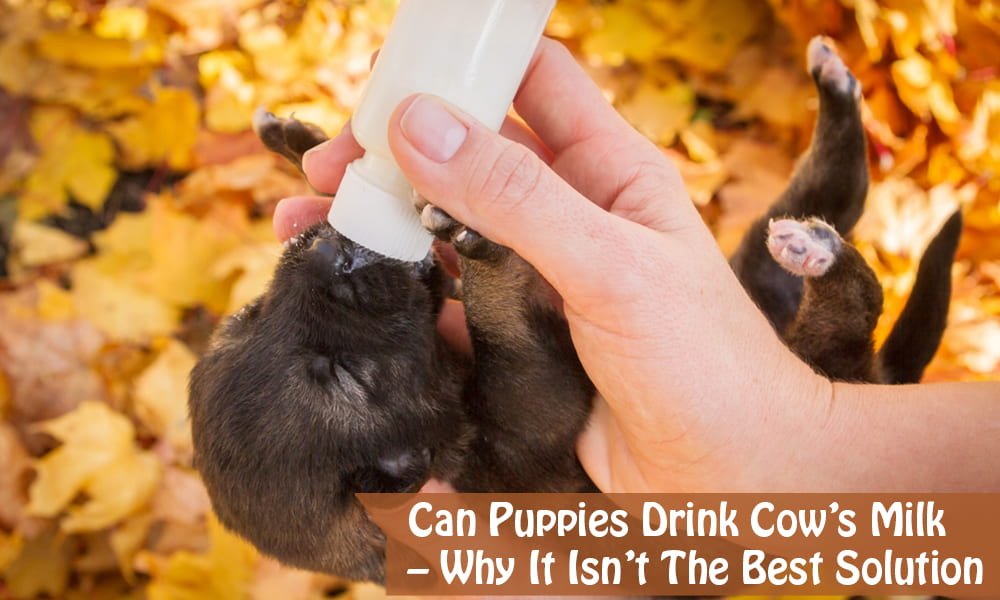
We know it’s not a good idea to give human foods and table scraps to our dogs, but what about milk? We know that milk is good for our teeth and bones, but does it have any benefits for dogs and puppies? Is the nutrition they’re getting from their food enough?
Let’s take a closer look at everything you need to know about milk, dairy, and your pet.
Contents
Can puppies drink milk that humans drink?
There’s no straightforward answer to whether puppies can drink milk. Like most things when it comes to food and your pet, the answer is pretty complicated. A little bit of milk every now and then probably isn’t going to hurt your dog, but there are some exceptions.
And remember, you should always talk to your vet before changing your dog’s food or giving them any type of milk.
Some vets think that puppies and dogs can drink cow’s milk or goat’s milk without a problem, but there’s always a risk of an allergic reaction, lactose intolerance, or long-term problems.
Animal milk contains lactose, so cow’s milk, goat’s milk, and the milk the puppies get from their mothers all contain it. When they are first born and should be getting all their nutrition from their mother’s dog milk, they have an abundant amount of an enzyme called lactase that breaks down lactose.
As they age and transition to other food, the amount of the lactase enzyme decreases, and they may not be able to handle animal milk.
What happens if your dogs drink milk?
Drinking cow’s milk or any animal milk isn’t toxic for your dog and a little bit here and it isn’t likely to hurt them. But as dogs get older, they’re likely to experience lactose intolerance, which can happen after drinking only a little bit of milk and can be uncomfortable for your dog.
Signs of a lactose intolerant dog include:
- Abdominal pain
- Bloating
- Diarrhea
- Gas
- Flatulence
- Loose stools
- Vomiting
Diarrhea and other symptoms may be caused by lactose, but milk fat can lead to these problems, too, especially if you give your dog whole milk.
It’s important to note that just because you gave your dog dairy and they didn’t initially have a problem, doesn’t mean there won’t be a consequence. Sometimes, it takes as long as 12 hours to see symptoms. It’s best to avoid dairy products in general for your dog.
Can dogs and puppies without lactose intolerance drink milk?
Say you gave your pet some milk and they didn’t have any adverse reactions. Is it safe to give your dog dairy if they are not lactose intolerant?
Milk has a lot of benefits for people. It’s an excellent source of protein, calcium, and vitamin D. But as far as your dog’s diet goes, its dog food should be formulated to give it the right amount of these nutrients anyway.
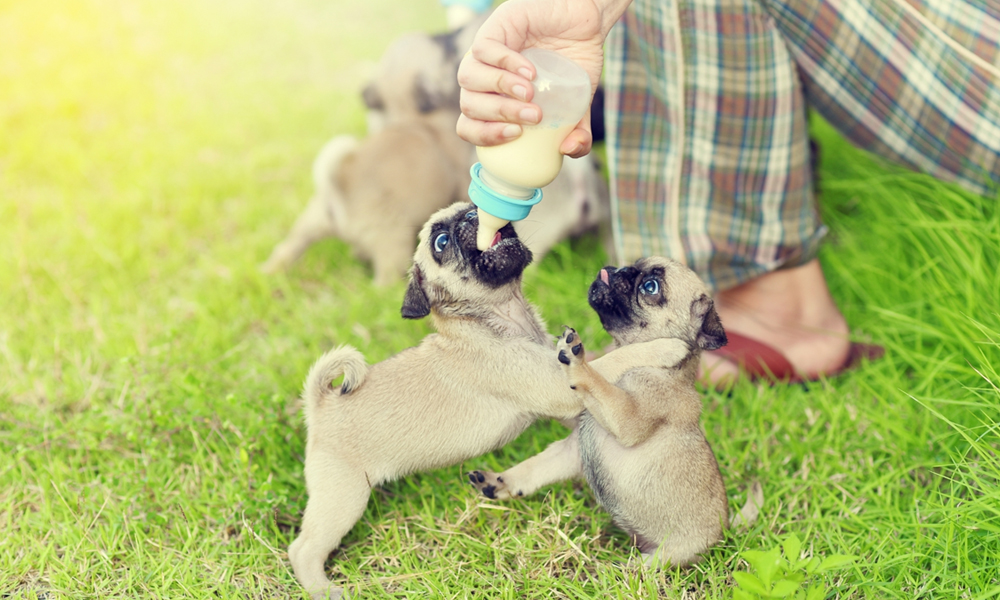
If your dog can tolerate it and it’s okay with your vet, you can give your dog milk as an occasional treat. But don’t overdo it.
In addition to the fat which can cause problems with digestion, milk also contains a lot of sugar, and too much sugar and fat can cause weight gain and other health issues for dogs, like pancreatitis. Remember to still give your dog plenty of water to keep them hydrated.
What about other types of milk?
Many people cannot drink cow’s milk or goat’s milk, and those with a vegetarian or vegan lifestyle avoid it by choice. As a result, there are many alternatives to animal milk and other dairy products, including almond milk, oat milk, and soy milk.
Can pet owners let their dogs drink milk from other sources?
When thinking about other milk sources, it’s very important to read labels carefully. Some nuts, like macadamia nuts, are toxic to dogs. Almonds are not as harmful, but dogs generally do not digest them well.
So, just because almond milk doesn’t contain lactose doesn’t mean that it’s safe for your dog. If you still want to give your dog some almond milk, offer a tablespoon or two as a treat every once in a while. Go with an unflavored and unsweetened option and never give anything with artificial sweeteners as they can be toxic for dogs.
Soy milk is just like almond milk or animal milk – safe in small amounts as an occasional treat. Soy milk contains something called isoflavones. Some of these may be harmful in large quantities, but soy is generally safe in small to moderate amounts. It doesn’t cause any GI problems (unless your dog is allergic to soy) and is an ingredient in some dog foods.
What about oat milk? Oats are not bad for dogs and oatmeal is a common ingredient in some high-quality dog foods. Like any other milk, oat milk is fine for your dog in small quantities.
Coconut milk is another milk substitute that is popular with people who avoid dairy products, but is it safe for your dog? Coconut milk is not toxic, but it contains a lot of oils that can be harmful in large amounts. In fact, the ASPCA includes coconut milk on a list of things that you should not give your dog.
Special Puppy Needs
We mentioned that puppies are better able to break down lactose than adult dogs, but does that mean that your puppy needs the health benefits of cow or goat milk?
The best milk for pups is the milk that comes from their mothers, but what do you do for a. puppy that was separated from its mother or orphaned?
Cow’s milk or goat’s milk is not a good alternative to mother’s dog milk for puppies. If you find yourself in the situation of needed to find a substitute for mother’s milk, use milk replacers. Dog’s milk is higher in calories and protein than cow’s milk, and it’s easier for puppies to digest.
If you’re looking for a good puppy milk replacer for a nursing pup, always talk to your vet or get advice from an animal medical center. That said, here are some of the most popular options some dog owners use.
Best Puppy Milk Replacers
PetAg Esbilac Goat’s Milk Powder Puppy Milk Replacer
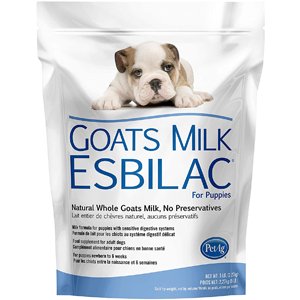
This puppy milk formula uses goat’s milk as a base, which means it’s a good choice for any puppy with a sensitivity to lactose. It contains all the vitamins, minerals, and amino acids that pups need to grow, and it’s a good option for adults and older dogs who are recovering from sickness or surgery. Mixing is really easy, just add one part powder to two parts warm water and mix a 24-hour supply.
PetAg Esbilac Powder Milk Replacer for Puppies and Dogs with Prebiotics and Probiotics
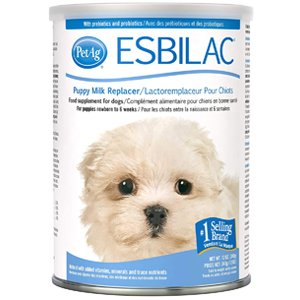
Esbilac is a great option that’s recommended for rejected or orphaned puppies. It’s formulated to match dog’s milk in energy and protein, and it contains vitamins, minerals, and the perfect balance of protein, fats, and carbohydrates to support healthy growth. This formula also contains probiotics and prebiotics for GI health. Puppies love the taste, and it’s easy to mix.
PetAg Petlac Milk Powder for Puppies
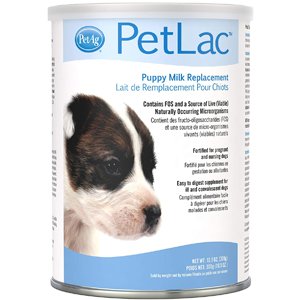
This milk replacement formula uses dried skim milk, vegetable oil, and soy as the main ingredients. It’s formulated for proper growth and development, and it includes vegetable proteins and micro-organisms that puppies need. PetAg Petlac Milk Powder for Puppies is meant for puppies up to six weeks old, and it can be used for lactating mothers and weaned puppies who need additional nutritional support. The mixing instructions are straightforward, and the brand gives you options for pregnant and lactating females, too.
Manna Pro Nurse All Multi-Species Milk Replacer with Probiotics
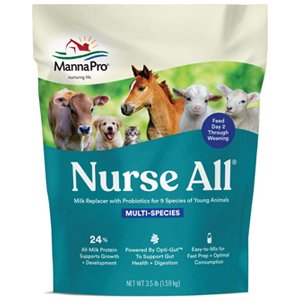
This product is a little different than the others on our list because it’s formulated for many species, including foals, lambs, piglets, and alpacas, but many people have used this for their pups and gotten tremendous results.
The protein comes from real milk to support appropriate development as well as Opti-Gut bacteria for GI health and digestion. Talk to your vet before using this product to make sure they recommend it. The product claims to be formulated for nine species but doesn’t specifically mention puppies. That said, many people have had success with it.
Savacaf Grade A Ultra 24 Multi-Species Milk Replacer
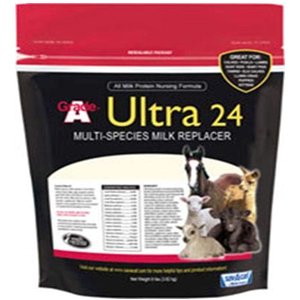
Here’s another formula that’s suitable for multiple species, including fawns, calves, lambs, and puppies. It’s easy to digest and pups seem to love the taste. This recipe uses high-quality natural ingredients, like dried whey, animal fats, and dried skimmed milk. It contains all the essential vitamins and nutrients puppies need to grow strong and healthy.
Final thoughts about dogs, dairy products, and cow’s milk
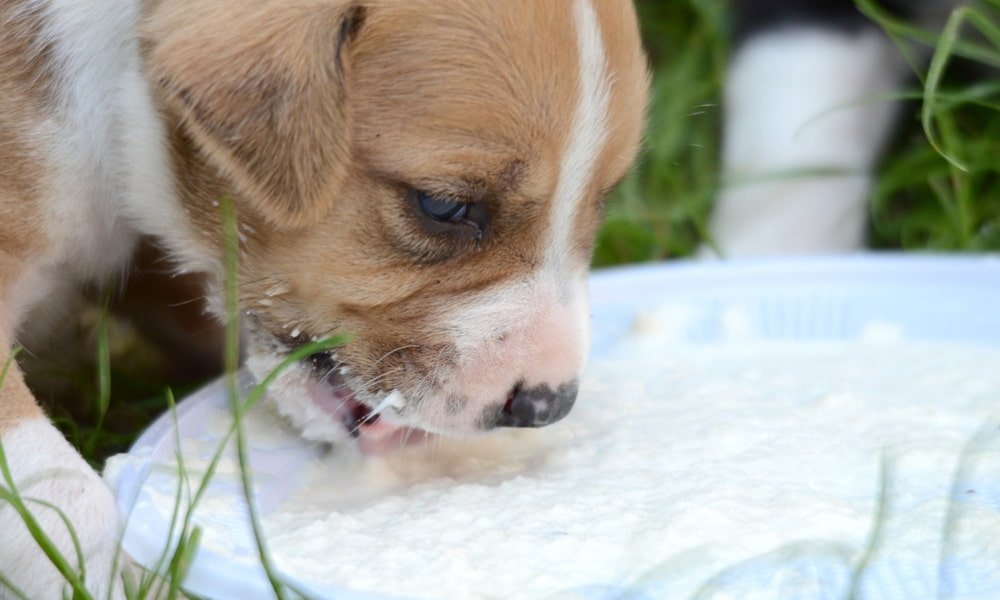
Remember, there’s nothing wrong with a little cow’s milk every once in a while, but for the most part, it’s best to avoid giving dairy products. If you’re using well-balanced pet food, you shouldn’t have to worry about supplementing any vitamins and minerals.
Some dogs are lactose intolerant, which means that dairy products like a cow or goat milk could lead to discomfort for your pet. The bottom line is that milk, no matter what kind of process was used to make them, can cause diarrhea or lead to food intolerance or a food allergy.
If you’re caring for a puppy who is orphaned or rejected and not yet ready for food, remember this. The best milk for canines is dog’s milk. There are alternative products out there that aren’t milk products and formulated to replicate dog milk as closely as possible. These are the best dog drinks for puppies that are relying on milk ingestion to survive.
We hope these tips helped you figure out the best options for dog owners to meet their pet’s needs when it comes to dairy and their dogs. Dogs from Clinton Hill to Comstock depend on us to keep them healthy throughout their lives, whether they’re at the age where they should still be nursing or their food needs have changed over time. In many cases, the fact is that milk isn’t something dogs need, and it can cause GI intolerance and diarrhea. But they won’t mind a spoonful now and then.

I have lived in big cities my entire life. Having grown up on the Upper East Side in Manhattan, my early life was an exciting one, filled to the brim with interesting encounters and opportunities popping up at every street corner. Like many city people, my passion for dogs first started when my parents decided to bring a puppy into the household. For them, it was a way of getting me to spend less time at his computer or wandering aimlessly around the city with my friends. Little did they know that bringing a Labrador Retriever into their apartment would determine not only the course of their son’s professional career but also my love life.
Having obtained a Computer Science Bachelor’s degree from Fordham University, I went on to pursue an IT career in the Big Apple. After a few years of doing basic cybersecurity and tech support work in various offices around Manhattan, I decided to leave New York and look for my calling in Boston, Massachusetts. There, I got a Master’s degree in Computer Science with a specialization in Web Development. As a means of supporting myself through college, he found a salesman job at a local paper company, where he met Mary, the love of my life and the person I’d end up creating My Sweet Puppy with.
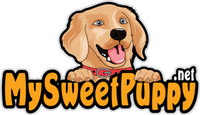
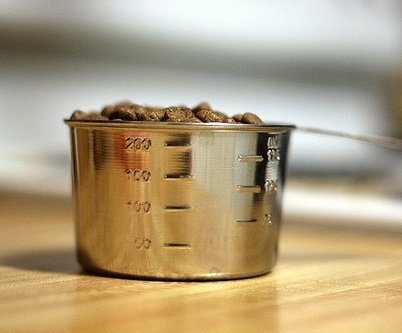
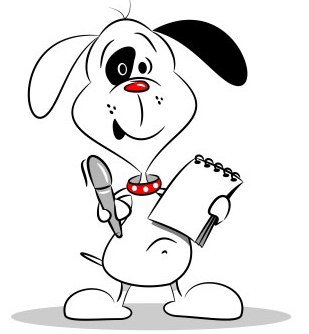
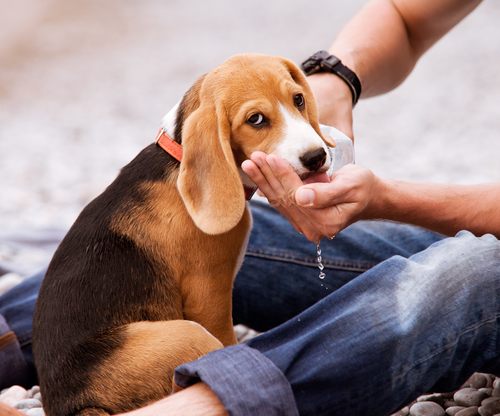
cheers!Offered great advice!
Thanks for connecting to Mysweetpuppy.net. Please keep in mind that I, Claudia Bensimoun, do not write any of the blogs or reviews on this website, nor have I in the past. I only answer the comments section.
At Mysweetpuppy.net we try to give all readers the most current and accurate information.
I fed my 3 days old puppy very diluted buffalo milk and also after some time I fed water does any thing happens to the new born dog??
Thanks for connecting to Mysweetpuppy.net. Please keep in mind that I, Claudia Bensimoun, do not write any of the blogs or reviews on this website, nor have I in the past. I only answer the comments section.
Please consult with your veterinarian for advice. Proper nutrition is most important during puppyhood.Pups need to consume the right amount of calories, proteins,vitamins,fats,and minerals. This should meet their needs for rapid growth and development. Your puppy should be nursing with his or her mother at three days old. Puppies will recieve a certain amount of immunity from their mother through the mother’s milk. Please keep in mind that puppies need to be with their mothers until at least 8 weeks of age.
Thanks for connecting to Mysweetpuppy.net. Please keep in mind that I, Claudia Bensimoun, do not write any of the blogs or reviews on this website, nor have I in the past. I only answer the comments section.Puppies need to drink a puppy formula and not cow’s milk. Cow’s milk will result in diarrhea, and also does not have enough phosphorus and calcium. Pups should be completely weaned by 8 weeks of age. Puppies and dogs do not have the enzyme to break down cow’s milk, and are lactose intolerant. Puppy parents can add puppy milk replacer or water to moisten puppy food.